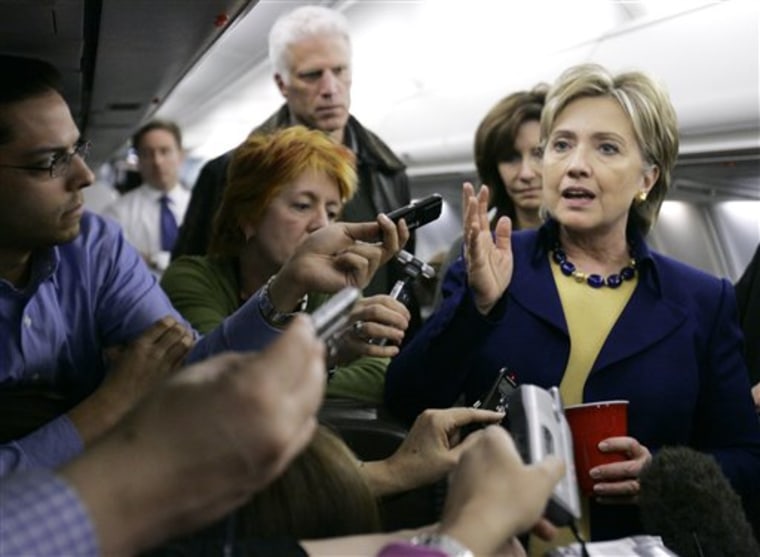Hillary Rodham Clinton sharpened her attacks on front-runner Barack Obama ahead of two crucial nomination showdowns Tuesday that could determine the fate of her faltering Democratic presidential campaign. Four states vote Tuesday, but the focus is on races in the big states of Texas and Ohio where the former first lady was campaigning Monday.
She desperately needs wins in both states to salvage her once-powerful bid to become the U.S.'s first female president and halt Obama's momentum following his streak of 11 consecutive wins since the Feb. 5 "Super Tuesday" races.
Recent polls show Clinton retains a lead — albeit a narrowing one — in Ohio, where residents have been hard hit by the U.S.'s economic troubles. In Texas, her once formidable lead has all but vanished and the race is now seen as a dead heat. A total of 370 delegates are at stake in the four races, including Vermont and Rhode Island.
Obama's aides said privately that they felt they had a good shot at a win in Texas, but were less certain about Ohio, where they braced for a possible loss. Polls show Clinton leading in Rhode Island, but Obama ahead in Vermont.
Obama, who is seeking to become the U.S.'s first black president, has spent the past couple of days fending off attacks by Clinton — and Republicans — over his foreign policy and national security experience.
"What precise foreign-policy experience is she claiming that makes her qualified to answer that telephone call at 3 a.m. in the morning?" Obama asked of the former first lady at a town-hall meeting in Westerville, Ohio. It was a reference to dueling television ads over who would exercise superior judgment in responding to a national emergency in the middle of the night.
Obama highlighted his opposition to the Iraq war during his successful 2002 Senate campaign months before the U.S.-led invasion. He criticized Clinton for failing to read the classified National Intelligence Estimate on Iraq's weapons capabilities, a report available at the time of her October 2002 vote authorizing the Iraq war.
"She didn't give diplomacy a chance. And to this day, she won't even admit that her vote was a mistake — or even that it was a vote for war," Obama said. "When it came time to make the most important foreign policy decision of our generation — the decision to invade Iraq — Senator Clinton got it wrong."
Clinton also campaigned in Westerville, telling more than 2,000 cheering backers that she wants to solve the economic troubles facing Ohio and other industrial Midwestern states.
"For some people this election is about how you feel, it's about speeches," the New York senator said in a veiled reference to her earlier criticism that Obama can offer little more than eloquent talk. "Well, that's not what it's about for me. It's about solutions."
On the Republican side, the party's presumptive nominee, Arizona Senator John McCain, held sizable leads over former Arkansas Governor Mike Huckabee in the polls and was expected to sweep all four contests Tuesday — with more than 250 delegates at stake.
A strong showing could bring McCain on the verge of securing the 1,191 delegates needed to claim the party's nomination at its convention in early September in St. Paul, Minnesota. McCain already has a total of 1,014 delegates, while Huckabee trails with 257.
McCain's nominee-in-waiting status has put pressure on Democratic leaders to bring their party's historic but increasingly negative nominating contest to an end because they fear that a drawn out battle could hurt the party's chances in the November election.
In recent days, Clinton campaign officials have suggested that if Obama does not win all four Tuesday contests, it would signal "buyers remorse" and be reason to continue the campaign to the next major primary, Pennsylvania on April 22.
But New Mexico Governor Bill Richardson, a former Democratic presidential candidate, disagreed.
"I just think that D-Day is Tuesday," Richardson said Sunday on CBS television's "Face the Nation" while declining to make an endorsement.
"We have to have a positive campaign after Tuesday. Whoever has the most delegates after Tuesday, a clear lead, should be the nominee," he said, bemoaning the negative tone of the campaigning and adding that the Democrats have to be ready for a "very strong John McCain."
Richardson, considered a potential vice presidential candidate, did not define what he would consider a solid lead. Going into Tuesday's contests, Obama has been leading the former first lady in the popular vote, committed delegates and fundraising.
Clinton, in a late-night meeting Sunday with reporters on her campaign plane, conceded she was toughening her rhetoric as the primary nears.
"I think we've been sharpening the contrast and I think it's a contrast that needs to be sharpened," Clinton said.
But she rejected suggestions the protracted contest would hurt the party in the fall election, arguing that tough primaries are "part of American politics" and that the party will unite and win in the November general election.
Obama has 1,385 delegates to Clinton's 1,276. A total of 2,025 is needed to secure the Democratic nomination at the party's convention in late August in Denver.
Obama heads to Texas on Monday for a final day of campaigning before awaiting returns on Tuesday in San Antonio.
After campaigning in Ohio on Monday, Clinton was to return to Texas later in the day and planned a televised town hall to be broadcast statewide at night. Aides said she would await Tuesday's election returns in Ohio.
